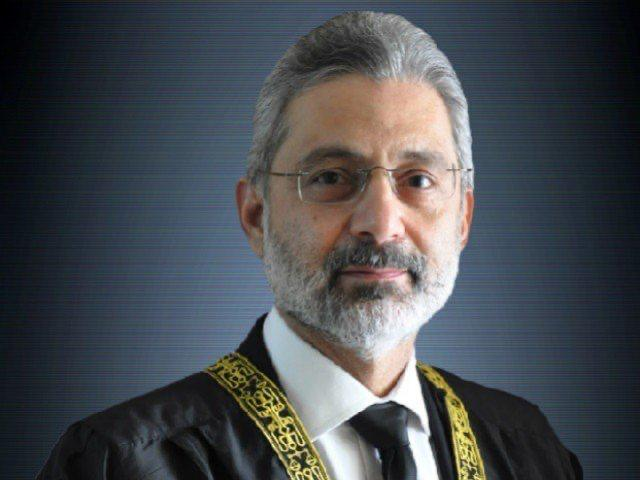Justice Isa again accuses former CJ of biasness
Claims Justice Khosa wanted him to resign in view of presidential reference

Since filing of a presidential reference against him in May last year, top court judge Qazi Faez Isa has been consistently accusing that former chief justice of Pakistan Asif Saeed Khosa was biased against him. In a fresh review petition, Justice Isa has alleged that Justice Khosa wanted his resignation.
"In retrospect, and keeping in mind what the Hon’ble Chief Justice had earlier spoken to the petitioner [Justice Isa] on the walking track behind the SC building, it becomes clear that the reason for ‘informally’ telling the petitioner about the reference was to secure [his] resignation," said the review petition.
However, last year Justice Isa had clarified that he has nothing but respect and regard for the former CJ and always treats him as his elder. He also acknowledged that he benefited from the rich experience and expertise of CJ Khosa in criminal matters while working with him at the Supreme Court.
"It is therefore all the more puzzling that his lordship (Khosa) has disrespected, disparaged, denigrated and castigated the petitioner in the strongest of terms," it read.
Last year Justice Isa in his petition stated that a month before the filing of the reference, Justice Khosa had discussed the matter with him while walking outside the SC building.
Justice Isa had, however, said he would disclose the conversation in-camera before the court in view of the sensitivity of the matter so that the former top judge might contradict him if given a chance.
Regarding the above discussion between the judges, sources close to Justice Khosa revealed that the former CJ had urged Justice Isa to simply dismiss review petitions filed against his judgment in Faizabad case and not to pass any adverse observation against the state institutions.
They said it was just an elder's advice to help Justice Isa avoid any further controversy. Justice Isa had, however, not attended the full-court reference organized in honour of Justice Khosa at his retirement.
Disagreement on legal matters
Justice Khosa in his Panamagate verdict had endorsed Justice Isa's jurisprudence about the applicability of Article 62 (1) (f) of the Constitution but Justice Isa had disagreed with his view on the reopening of Hudabiya Paper Mills case against the Sharif family in December 2017.
Justice Isa had authored the judgment on the dismissal of the National Accountability Bureau’s (NAB) appeal for reopening of the Hudabiya Paper Mills case.
During hearing of that case, Justice Isa had expressed anger over NAB deputy prosecutor general for referring again and again to a minority judgment in Panamagate written by Justice Khosa.
He had noted that the judgment was not binding on the bench. The SC judge had even warned the prosecutor that he could face a contempt notice if he once again referred to the minority judgment.
In 2018, a three-judge bench, headed by Justice Khosa, held that Justice Qazi Faez Isa's findings as head of the Quetta Commission against former interior minister Chaudhry Nisar were not to be treated as findings of the apex court. Justice Isa's findings were also not made part of the SC order.
Justice Isa had also disagreed with the view of Justice Khosa about the effects of a compromise in criminal cases. He had requested the then CJ Saqib Nisar to constitute a larger bench to examine if compounding of an offence under Section 345 (CrPC) amounts to acquittal of an accused or not.
The controversy arose in March 2017, when Justice Qazi Faez Isa differed with the majority opinion on this point and said a compromise with the heirs in criminal matters “cannot affect the conviction”.
Later, the then chief justice had referred the matter to the three-judge bench for giving a final opinion. Justice Khosa in the majority opinion said the court appreciated “the intensity and sincerity” of the sentiment expressed by Justice Isa.
“[But the court could not agree with] his lordship so as to interpret the existing law in the light of some hypothetical possibilities in this world and retribution or redemption in the hereafter".
However, the matter is yet to be decided as a recent judgment, authored by Justice Isa, said a number of provisions were not considered by the bench led by Justice Khosa “most probably because the requisite assistance was not provided by law officers”.



















COMMENTS
Comments are moderated and generally will be posted if they are on-topic and not abusive.
For more information, please see our Comments FAQ